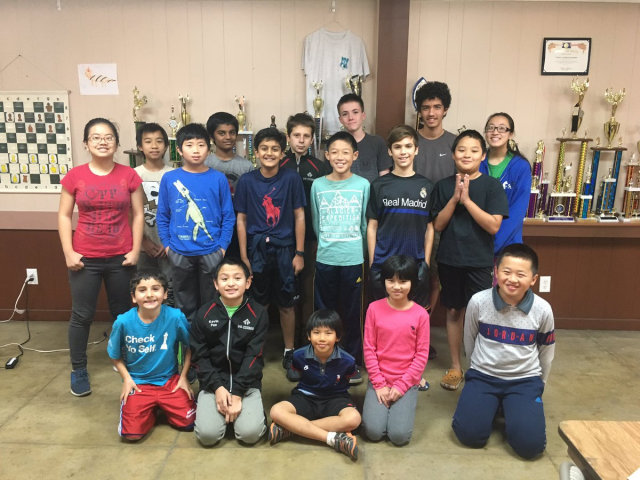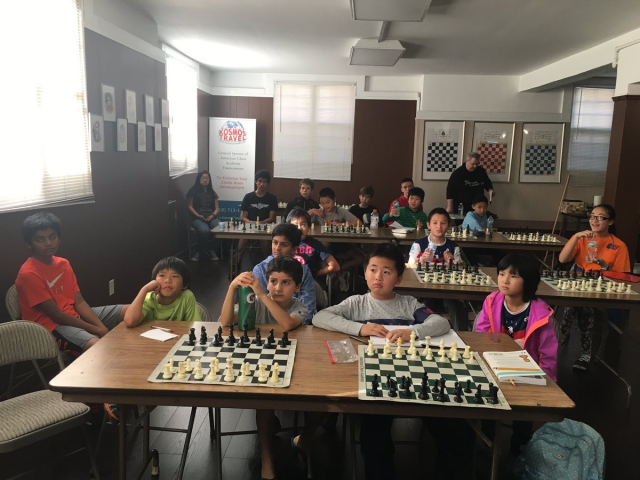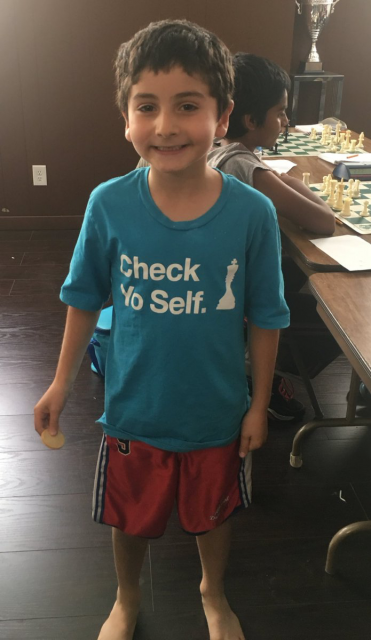 Standing (left to right): Julia Sevilla, Danny Soong, Derek Jin, Sandeep Sethuraman, Vyom Vidyarthi, Robert Shlyakhtenko, Alan Song, Alex Costello, Gabriel Eidelman, Joaquin Perkins, Leonard Vu, Cindy Zhang;
Standing (left to right): Julia Sevilla, Danny Soong, Derek Jin, Sandeep Sethuraman, Vyom Vidyarthi, Robert Shlyakhtenko, Alan Song, Alex Costello, Gabriel Eidelman, Joaquin Perkins, Leonard Vu, Cindy Zhang;Sitting: Aren Emrikian, Kevin Pan, Marvin Gao, Rui Yang Yan, Eric Li
Day 1
Armen started by discussing the importance of analyzing your games by yourself, finding your weaknesses, and being creative in the opening - without mindlessly adhering to theory and engine lines. It is extremely important to have the ability to work by yourself without the help of engines; otherwise they will simply give you evaluations and variations without giving you an actual understanding of the position. He proceeded to talk about the criteria of positional evaluation in balanced positions. The basic five criteria are:- King Safety (this is always the most important; the rest are not necessarily in any specific order).
- Central control.
- Piece placement
- Pawn Structure and Squares.
- Lines and Diagonals.
Of course, the criteria need to be adjusted in unbalanced positions with, for example, different amounts of material.
Using these criteria, how would you evaluate the following position how would you continue?
Kotov vs. Kalmanok
1936
White to move.
[pgn][Event "Moscow-ch17"]
[Site "Moscow "]
[Date "1937.11.??"]
[Round "?"]
[White "Kotov, Alexander"]
[Black "Kalmanok"]
[Result "1-0"]
[ECO "C13"]
[Annotator "Shlyakhtenko,Robert"]
[SetUp "1"]
[FEN "r1bqk2r/p2nbp1p/1pp1pp2/8/2BPN3/5N2/PPPQ1PPP/R3K2R w KQkq - 0 10"]
[PlyCount "25"]
[EventDate "1937.11.??"]
[EventType "tourn"]
[EventRounds "17"]
[EventCountry "URS"]
[Source "ChessBase"]
[SourceDate "2011.11.24"]10. Qh6 $1 {The threat of Qg7 is very annoying. Black played} Bf8 11. Qf4 $1 {
Preventing Qc7.} Bb7 12. O-O-O h5 13. Kb1 Be7 14. Qg3 Nf8 15. Rhe1 {By now
white's position is overwhelming. After} f5 $2 16. d5 $1 cxd5 17. Bb5+ Nd7 18.
Ne5 Qc7 19. Bxd7+ Kd8 20. Qg7 Rf8 21. Ng5 Qc5 22. Bxe6 {Black resigned (if 22..
.fxe6 23.Nxe6+ black loses his queen).} 1-0[/pgn]
Next we proceeded to talk about the concept of the “annoying piece.” How would you continue in the following position?
Nimzovich vs. Capablanca
1914
White to move.
[pgn][Event "St Petersburg preliminary"]
[Site "St Petersburg"]
[Date "1914.04.21"]
[Round "1"]
[White "Nimzowitsch, Aron"]
[Black "Capablanca, Jose Raul"]
[Result "0-1"]
[ECO "C62"]
[Annotator "Shlyakhtenko,Robert"]
[SetUp "1"]
[FEN "2r1r1k1/2pq1pbp/Q1pp1np1/8/4P3/2N5/PPP2PPP/R1B2RK1 w - - 0 15"]
[PlyCount "24"]
[EventDate "1914.04.21"]
[EventType "tourn"]
[EventRounds "11"]
[EventCountry "RUS"]
[Source "ChessBase"]
[SourceDate "1998.03.26"]{In this position white's queen on a6 is an "annoying piece." The queen is
exposed here, but it prevents black from regrouping his forces with
Qe6-Nd7-Ne5-Nc4. It is psychologically hard to keep a queen so far in enemy
territory, but as long as the queen is doing something there, on no account
should it be removed. But Nimzowitsch did just that:} 15. Qd3 $2 Qe6 16. f3 Nd7
$1 17. Bd2 Ne5 18. Qe2 Nc4 19. Rab1 Ra8 {Now black has the typical "Benko
Gambit" compensation for the pawn.} 20. a4 Nxd2 21. Qxd2 Qc4 22. Rfd1 Reb8 23.
Qe3 Rb4 24. Qg5 Bd4+ 25. Kh1 Rab8 {By now black's pressure is too strong to
withstand. Nimzowitsch sacrifices the exchange and after} 26. Rxd4 Qxd4 {black
went on to win.} 0-1[/pgn]
One game on this topic that I particularly enjoyed was Maxime Vachier-Lagrave’s beautiful win against Ding Liren in the 2013 Alekhine Memorial:
Vachier-Lagrave vs. Ding
2013
Black to move.
[pgn][Event "Alekhine Memorial"]
[Site "Paris/St Petersburg"]
[Date "2013.04.22"]
[Round "2"]
[White "Vachier Lagrave, Maxime"]
[Black "Ding, Liren"]
[Result "1-0"]
[ECO "B12"]
[WhiteElo "2722"]
[BlackElo "2707"]
[Annotator "Shlyakhtenko,Robert"]
[SetUp "1"]
[FEN "rn2kb1r/pp2pppb/2p1Pn1p/3p4/3P1BPP/2N2P2/PqPK4/R2Q1BNR b kq - 0 10"]
[PlyCount "58"]
[EventDate "2013.04.21"]
[EventType "tourn"]
[EventRounds "9"]
[EventCountry "FRA"]
[EventCategory "20"]
[Source "ChessBase"]
[SourceDate "2013.05.15"]{Again, black's queen is exposed on b2, but on the other hand it is rather
annoying on this square. The only thing needed to be done is to prevent 11.Rb1,
winning the b7 pawn. Black can play 10...b5, but then there is 11.a3! followed
by 12.Ra2, winning the queen, so the best move is 10...Qa3! and black is
probably even better. Instead, black played} 10... Qb6 $2 {and lost in
brilliant fashion:} 11. Nge2 a6 12. Rb1 Qa7 13. Na4 b5 14. Nc5 Bg8 15. Be5 fxe6
16. Nf4 Nbd7 17. Nxd7 Nxd7 18. Ng6 Nxe5 19. dxe5 Rh7 20. h5 c5 21. f4 Bf7 22.
Qf3 O-O-O 23. Be2 c4 24. a4 Kc7 25. axb5 axb5 26. Rxb5 Qd4+ 27. Ke1 Ra8 28. Rb1
Ra2 29. c3 Qd2+ 30. Kf2 Rc2 31. Qe3 Qxe3+ 32. Kxe3 Rxc3+ 33. Kd4 Rc2 34. Rhe1
Kc6 35. Rb8 Bxg6 36. hxg6 Rh8 37. Reb1 Rd2+ 38. Ke3 Ra2 39. R8b6+ 1-0[/pgn]
Day 2
In the first half Armen talked about how to “diagnose yourself”, or in other words, to find what areas of the game you need to improve on. One strategy that he suggested is look at several of your games, divide them into three sections (opening, middlegame, and endgame), and then count how many mistakes you make in each stage of the game, and then focus on the part of the game where you are making the most mistakes. He then chose a game from one of the students to analyze...in fact the game that he chose was mine!In the second half, IM Greg Shahade gave a lecture on prophylactic moves. The first game that he showed was played by Yusupov. I was absolutely stunned by the depth of black’s ideas:
Gavrikov-Yusupov
1985
Black to move.
[pgn][Event "Tunis Interzonal"]
[Site "Tunis"]
[Date "1985.??.??"]
[Round "1"]
[White "Gavrikov, Viktor"]
[Black "Jussupow, Artur"]
[Result "0-1"]
[ECO "D58"]
[WhiteElo "2550"]
[BlackElo "2590"]
[Annotator "Shlyakhtenko,Robert"]
[SetUp "1"]
[FEN "2rq1rk1/pb2bpp1/1p2p2p/4N3/3P4/1BP3P1/P3QPP1/2RR2K1 b - - 0 19"]
[PlyCount "27"]
[EventDate "1985.04.??"]
[EventType "tourn"]
[EventRounds "17"]
[EventCountry "TUN"]
[EventCategory "11"]
[Source "ChessBase"]
[SourceDate "1999.07.01"]
{White has three basic ideas in this position: 1. He can exploit the
weakness of the b1-h7 diagonal with Qd3 and Bc2; 2. He can try to play for
a knight sacrifice on f7; 3. He can try to play c4-d5, creating a strong
passed pawn. Black prevented all of these three ideas with one move.} 19...
Rc7 $3 {Now on Qd3-Bc2 black can simply play Bf6 and g6!, and there are no
sacrifices on g6 because the rook is defending the seventh rank. Similarly,
this move lessens the effectiveness of the Nxf7, again because the rook is
defending the seventh rank. And if 20.c4 black can play 20...Qa8! 21.f3 Rfc8,
with strong pressure against the hanging pawns. The game continued} 20. Qd3 Bf6
21. Ng4 h5 22. Ne3 Rd7 23. g4 hxg4 24. Nxg4 g6 25. Re1 Kg7 26. Rcd1 Rh8 27. Qg3
Rh5 28. Qf4 Be7 29. Qc1 Bd6 30. Ne5 Qh4 31. f3 Qg3 32. Re3 Rd8 {and White
resigned.} 0-1[/pgn]
Day 3
On this day we discussed Defense. Unfortunately, I missed the first 24 minutes of the class - the entrance to the 101 South from the I-405 was closed, and we had to take a huge detour. On the plus side, I never knew that California had such beautiful mountain scenery. We also had an intuition test in the afternoon administered by FM Aviv Friedman. There were 30 puzzles in which you had to suggest just one move, but you only had one minute per puzzle. It was not very difficult as in previous camps, and I managed to do quite well with 18/30.Day 4
We continued discussing defense (in particular, counterattacking), and also held a 10 second with 1 second increment knockout tournament (I suggested a 1 second tournament but strangely enough the idea was not met with much enthusiasm). Congratulations to winners Julia Sevilla and Eric Li, who drew about 5 games in the finals before they were declared co-champions! (I was knocked out in Round 2 after blundering my queen on move 10). You can watch the tournament here: https://www.youtube.com/watch?v=1NFwPVrDEWk Here are a couple photos from the camp: The start of the camp
The start of the camp I played a world champion for the first time - pictured is U8 World Champion and part-time tactical monster Aren Emrikian! I even managed to beat him 3-2 (I hope nobody mentions my extreme luck in all the games).
I played a world champion for the first time - pictured is U8 World Champion and part-time tactical monster Aren Emrikian! I even managed to beat him 3-2 (I hope nobody mentions my extreme luck in all the games).Of course the highlight of the camp was beating Greg Shahade in 1 second chess (I hope this gets past editing):
https://www.youtube.com/watch?v=JSaQpRmVWR0 Not only did I learn a lot, but the camp provided an excellent opportunity to warm up for the 53rd Annual American Open tournament in Costa Mesa, CA, held over the Thanksgiving weekend. Pretty much everyone who attended both the camp and the tournament did well there: Gabriel Eidelman tied for first in the U2200 Section, Joaquin Perkins finished in a tie second in the same section, and even I managed to upset an IM and a WGM in the Open section! This was an absolutely amazing opportunity for me. It was a great privilege to learn from IM Ambartsoumian and to work together with so many other youngsters of a similar rating. I cannot thank enough organizers Greg Shahade, Aviv Friedman, and Dr. Jim Roberts (who has been sponsoring the US Chess School for almost ten years!) for the incredible camp. Follow the US Chess School on their website and instagram.Categories
Archives
- January 2026 (2)
- December 2025 (27)
- November 2025 (29)
- October 2025 (39)
- September 2025 (27)
- August 2025 (29)
- July 2025 (43)
- June 2025 (25)
- May 2025 (24)
- April 2025 (29)
- March 2025 (29)
- February 2025 (20)
- January 2025 (24)
- December 2024 (34)
- November 2024 (18)
- October 2024 (35)
- September 2024 (23)
- August 2024 (27)
- July 2024 (44)
- June 2024 (27)
- May 2024 (31)
- April 2024 (51)
- March 2024 (34)
- February 2024 (25)
- January 2024 (26)
- December 2023 (29)
- November 2023 (26)
- October 2023 (37)
- September 2023 (27)
- August 2023 (37)
- July 2023 (47)
- June 2023 (33)
- May 2023 (37)
- April 2023 (45)
- March 2023 (37)
- February 2023 (28)
- January 2023 (31)
- December 2022 (23)
- November 2022 (32)
- October 2022 (31)
- September 2022 (19)
- August 2022 (39)
- July 2022 (32)
- June 2022 (35)
- May 2022 (21)
- April 2022 (31)
- March 2022 (33)
- February 2022 (21)
- January 2022 (27)
- December 2021 (36)
- November 2021 (34)
- October 2021 (25)
- September 2021 (25)
- August 2021 (41)
- July 2021 (36)
- June 2021 (29)
- May 2021 (29)
- April 2021 (31)
- March 2021 (33)
- February 2021 (28)
- January 2021 (29)
- December 2020 (38)
- November 2020 (40)
- October 2020 (41)
- September 2020 (35)
- August 2020 (38)
- July 2020 (36)
- June 2020 (46)
- May 2020 (42)
- April 2020 (37)
- March 2020 (60)
- February 2020 (38)
- January 2020 (45)
- December 2019 (34)
- November 2019 (35)
- October 2019 (42)
- September 2019 (45)
- August 2019 (56)
- July 2019 (44)
- June 2019 (35)
- May 2019 (40)
- April 2019 (48)
- March 2019 (61)
- February 2019 (39)
- January 2019 (30)
- December 2018 (29)
- November 2018 (51)
- October 2018 (45)
- September 2018 (29)
- August 2018 (49)
- July 2018 (35)
- June 2018 (31)
- May 2018 (39)
- April 2018 (31)
- March 2018 (26)
- February 2018 (33)
- January 2018 (30)
- December 2017 (26)
- November 2017 (24)
- October 2017 (30)
- September 2017 (30)
- August 2017 (31)
- July 2017 (28)
- June 2017 (32)
- May 2017 (26)
- April 2017 (37)
- March 2017 (28)
- February 2017 (30)
- January 2017 (27)
- December 2016 (29)
- November 2016 (24)
- October 2016 (32)
- September 2016 (31)
- August 2016 (27)
- July 2016 (24)
- June 2016 (26)
- May 2016 (19)
- April 2016 (30)
- March 2016 (36)
- February 2016 (28)
- January 2016 (32)
- December 2015 (26)
- November 2015 (23)
- October 2015 (16)
- September 2015 (28)
- August 2015 (28)
- July 2015 (6)
- June 2015 (1)
- May 2015 (2)
- April 2015 (1)
- February 2015 (3)
- January 2015 (1)
- December 2014 (1)
- July 2010 (1)
- October 1991 (1)
- August 1989 (1)
- January 1988 (1)
- December 1983 (1)







